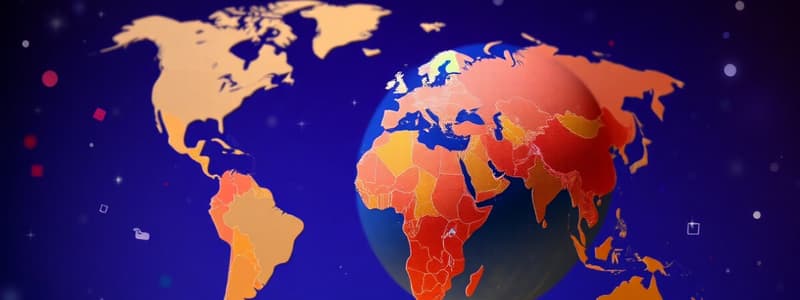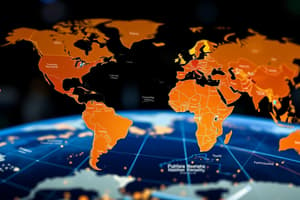Podcast
Questions and Answers
What is one characteristic of a global citizen as per the Ontario Ministry of Education?
What is one characteristic of a global citizen as per the Ontario Ministry of Education?
- Preference for local issues over global ones
- Promotion of sustainable living (correct)
- Disregard for cultural differences
- Lack of respect for diversity
According to Guo (2014), what commonality do students from diverse backgrounds share?
According to Guo (2014), what commonality do students from diverse backgrounds share?
- Their political affiliations
- Their personal experiences
- Their cultural beliefs
- Their educational opportunities (correct)
What does the OECD Global Competence Framework focus on?
What does the OECD Global Competence Framework focus on?
- Stimulating international trade only
- Regulatory standards for education
- Fostering economic progress and global competence (correct)
- Promoting cultural uniformity
What is one of the roles that schools play in promoting global competence?
What is one of the roles that schools play in promoting global competence?
Which of the following best describes globally competent individuals?
Which of the following best describes globally competent individuals?
What is an aspect of respecting diversity according to the Ontario Ministry of Education?
What is an aspect of respecting diversity according to the Ontario Ministry of Education?
What is a key goal of teaching global competence in schools?
What is a key goal of teaching global competence in schools?
How is global competence described as a learning goal?
How is global competence described as a learning goal?
What is the main focus of multicultural literacy?
What is the main focus of multicultural literacy?
Which of the following is NOT a positive impact of globalization?
Which of the following is NOT a positive impact of globalization?
According to Banks (2003), teaching students multiculturalism is primarily about:
According to Banks (2003), teaching students multiculturalism is primarily about:
What does global literacy aim to address?
What does global literacy aim to address?
What is one of the negative impacts of globalization?
What is one of the negative impacts of globalization?
How does globalization affect economic aspects of life?
How does globalization affect economic aspects of life?
What is a significant goal of multicultural literacy as per Buotte (2008)?
What is a significant goal of multicultural literacy as per Buotte (2008)?
What does the term 'globalization' primarily refer to?
What does the term 'globalization' primarily refer to?
What is the primary focus of social literacy?
What is the primary focus of social literacy?
Which of the following is NOT a method of attaining social skills?
Which of the following is NOT a method of attaining social skills?
Effective communication is essential in social literacy. Which of the following is an example of effective communication?
Effective communication is essential in social literacy. Which of the following is an example of effective communication?
What is the purpose of conflict resolution within the scope of social skills?
What is the purpose of conflict resolution within the scope of social skills?
How can networking contribute to social literacy?
How can networking contribute to social literacy?
Which characteristic is not typically associated with a healthy learning environment?
Which characteristic is not typically associated with a healthy learning environment?
What role do teachers play in developing students' social skills?
What role do teachers play in developing students' social skills?
Which statement best describes social literacy?
Which statement best describes social literacy?
What is one of the main reasons for promoting global competence among students?
What is one of the main reasons for promoting global competence among students?
Which dimension of global competence focuses on understanding others' perspectives?
Which dimension of global competence focuses on understanding others' perspectives?
What role do digital technologies play in the development of global competence?
What role do digital technologies play in the development of global competence?
How can global competence improve employability?
How can global competence improve employability?
What does the dimension of 'Take action for collective well-being' emphasize?
What does the dimension of 'Take action for collective well-being' emphasize?
What does intercultural sensitivity encourage among students?
What does intercultural sensitivity encourage among students?
According to PISA's perspective on global competence, what practices do globally competent individuals exhibit?
According to PISA's perspective on global competence, what practices do globally competent individuals exhibit?
Why is it important for young people to engage in social, political, economic, and environmental discussions?
Why is it important for young people to engage in social, political, economic, and environmental discussions?
What is a feature of globally competent individuals' interactions?
What is a feature of globally competent individuals' interactions?
What is one benefit of keeping commitments?
What is one benefit of keeping commitments?
How can helping others impact relationships?
How can helping others impact relationships?
What is a consequence of not protecting yourself from emotional sabotage?
What is a consequence of not protecting yourself from emotional sabotage?
Which tool focuses on recognizing and managing emotions for teachers?
Which tool focuses on recognizing and managing emotions for teachers?
What does the Emotional Literacy Museum aim to teach?
What does the Emotional Literacy Museum aim to teach?
What is the purpose of Mixed Emotions Cards?
What is the purpose of Mixed Emotions Cards?
What is suggested as a reminder that emotions are part of our physiology?
What is suggested as a reminder that emotions are part of our physiology?
Which option describes a strategy to enhance emotional intelligence in schools?
Which option describes a strategy to enhance emotional intelligence in schools?
Flashcards are hidden until you start studying
Study Notes
Globalization
- Globalization is the growing interdependence of economies, cultures, and populations worldwide. It's driven by cross-border trade, technology, investment flows, and information sharing.
- Globalization accelerates the movement and exchange of people, goods, services, capital, technologies, and cultural practices globally.
- It has a profound impact on economic, social, political, and cultural aspects of life, presenting both opportunities and challenges.
Positive Impacts of Globalization
- Creates jobs by expanding markets and increasing global trade.
- Lowers prices of consumer goods through increased competition and lower production costs.
- Fuels innovation by fostering knowledge sharing and collaboration.
- Promotes cultural convergence by exposing people to different cultures and perspectives.
- Facilitates fast and easy access to information through the internet and global communication networks.
Negative Impacts of Globalization
- Contributes to inequality by widening the gap between wealthy nations and developing countries.
- Exacerbates environmental problems due to increased consumption, pollution, and resource depletion.
- Leads to cultural homogenization, potentially eroding unique cultural identities (acculturation).
- Enables diseases and viruses to spread more quickly across borders due to increased travel and interconnectedness.
Multicultural Literacy
- Focuses on diversity, equity, and social justice, aiming to foster cultural awareness and challenge discrimination against different ethnicities.
- Helps students develop 21st-century skills and attitudes to become active citizens who promote justice within communities.
- Aims to cultivate empathy and tolerance in schools by encouraging a deeper understanding and appreciation of diverse cultures.
Global Literacy
- Addresses issues of globalization, racism, diversity, and social justice.
- Requires awareness and action driven by a broad understanding of humanity, the planet, and the impact of human decisions.
- Aims to empower students with knowledge and provide them with the tools to create positive change in the world and their communities.
Global Citizen
- Respects all humans regardless of race, gender, religion, or political perspectives.
- Values diversity and various perspectives.
- Promotes sustainable living, consumption, and production patterns.
- Appreciates the natural world and demonstrates respect for the rights of all living things.
Interconnecting Multicultural and Global Literacy
- Classrooms contain students from diverse racial, religious, and cultural backgrounds.
- Acknowledges that students share a commonality in their educational opportunity, despite diverse behaviors, cultural values, and communication patterns.
- Highlights the importance of recognizing and respecting other cultures, fostering inclusive learning environments.
OECD Global Competence Framework
- Created by the Organization for Economic Cooperation and Development (OECD).
- Aims to stimulate economic progress and world trade.
Global Competence
- Represents a multidimensional, lifelong learning goal.
Globally Competent Individuals
- Possess the ability to examine local, global, and intercultural issues.
- They understand and appreciate diverse perspectives and worldviews.
- Engage in open, appropriate, and effective interactions with people from different cultures.
- Act for collective well-being and sustainable development.
- They are engaged citizens, collaborative problem solvers, and ready for the workforce.
Promoting Global Competence in Schools
- Schools play a crucial role in developing global competence in young people.
- Schools should provide opportunities to critically examine global developments relevant to the world and students' lives.
- Teach students how to use digital information and social media platforms critically, effectively, and responsibly.
- Encourage intercultural sensitivity and respect through experiences that foster an appreciation for diverse peoples, languages, and cultures.
- Enhance young people's understanding of their place in the community and the world, improving their judgment and action-taking abilities.
The Need for Global Competence
- To live harmoniously in multicultural communities: Promotes cultural awareness and positive interactions in diverse societies.
- To thrive in a changing labor market: Boosts employability through effective communication, teamwork, and technological proficiency.
- To use media platforms effectively and responsibly: Equips young people to navigate the digital landscape critically and responsibly.
- To support the Sustainable Development Goals: Fosters a generation that cares about global issues and engages in social, political, economic, and environmental discussions.
### Dimensions of Global Competence: Implications to Education
- Dimension 1: Examine issues of local, global, and cultural significance: Refers to effectively utilizing knowledge about the world and critical reasoning to form independent opinions on global issues.
- Dimension 2: Understand and appreciate the perspectives and world views of others: Involves being willing and capable of considering other people's perspectives and behaviors from multiple viewpoints, examining one's own assumptions.
- Dimension 3: Engage in open, appropriate, and effective interactions across cultures: Describes how globally competent individuals interact with people from different cultures.
- Dimension 4: Take action for collective well-being and sustainable development: Focuses on young people's roles as active and responsible members of society, demonstrating a readiness to respond to local, global, or intercultural issues.
### Social Literacy
- Encompasses developing social skills, knowledge, and positive human values.
- It's about the ability to act and react positively and responsibly in complex social settings.
- Can be acquired through social processes of inquiry, values exploration, and social decision-making.
- Demonstrated in schools through interactions with peers, teachers, families, and the media.
### Social Skills
- Essential for building, maintaining, and growing relationships.
- Can be acquired through:
- Gaining ideas, information, techniques, and perspectives from experts.
- Sharing one's perspective.
- Accomplishing tasks and working towards shared goals.
- Providing mutual support.
- Expanding networks.
- Gaining feedback and referrals.
- Creating a healthy and conducive learning environment.
### Types of Social Skills
- Effective communication: Communicating thoughts and ideas effectively through conversations, discussions, and other interactions.
- Conflict resolution: Finding workable solutions by weighing both sides and aiming for reconciliation.
- Forgiveness: Releasing pain and letting go of hurt.
- Keeping commitments: Developing a strong reputation for reliability and trustworthiness.
- Helping others: Building trust and inspiring others.
- Protecting ourselves from emotional sabotage: Being wise enough to protect oneself from emotional manipulation.
### Recommended Tools in Enhancing Emotional Intelligence
- Emotional Literacy Workshop: Helps teachers and students communicate effectively, manage emotions, and increase self-awareness.
- Emotional Literacy Museum: Provides self-directed learning about the physiology of emotions, emotional regulation, and literacy.
- Mixed Emotions Cards: Offers a deck of "tarot-like" cards representing feelings and synonyms.
- eMotion Cards: Evokes emotions through playful moon face illustrations without labels.
- Biodots: Simple reminders that emotions are part of one's physiology.
Studying That Suits You
Use AI to generate personalized quizzes and flashcards to suit your learning preferences.




